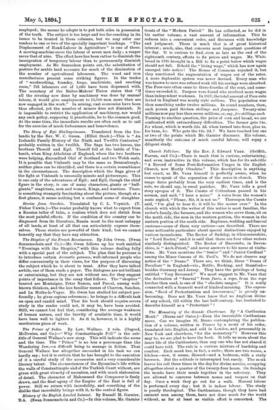Church Folk - lore. By the Rev. J. Edward Vaux. (Griffith, Ferran,
and Co.)—There is much that is curious, entertaining, and even instructive in this volume, which has for its sub-title "A Record of Some Post-Reformation Usages in the English Church, now Mostly Obsolete." This description is anything but exact, as Mr. Vaux himself is perfectly aware, when he comes to speak of the separation of the sexes in church. This usage dates probably from the very earliest times, and is the rule, we should say, in rural parishes. Mr. Vaux tells a good story apropos of it. The Curate of Cottenham paused in his sermon, and said, " I hear a noise." A voice from the women's seats replied, "Please, Sir, it is not us." Thereupon the Curate said, " I'm glad to hear it ; it will be the sooner over." In the church with which the writer of this notice is most familiar, the rector's family, the farmers, and the women who serve them, sit on the north side, the men in the western portion, the women in the eastern portion of the south side. Baptisms, wedding and funeral customs—some of them very curious—are described. There are some noticeable particulars about special distinctions enjoyed by various incumbents. The Rector of Sudeley, in Gloucestershire, is " Lord Rector," and it is said that there are four other rectors similarly distinguished. The Rector of Haccombe, in Devon- shire, is " Arch-Priest," and never answers to his name at visita- tions. Mr. Vaux mentions the " Senior " and "Junior Cardinal" among the Minor Canons of St. Paul's. We do not observe any notice of the " Deans." There are, we think, three " Deans of Peculiars " in England—viz., Battle, Docking, and Stamford— besides Guernsey and Jersey. They have the privilege of being entitled " Very Reverend." We must suggest to Mr. Vaux that the derivation of "funeral" from funs, a rope, from the rope torches then used, is one of the " obsolete usages." It is really connected with a Sanscrit word of kindred meaning. The expres- sion. "flood of Protestantism and irreverence," is grossly un- becoming. Does not Mr. Vaux know that no Anglican divine of any school, till within the last half-century, has. hesitated to describe himself as a " Protestant" ?






































 Previous page
Previous page